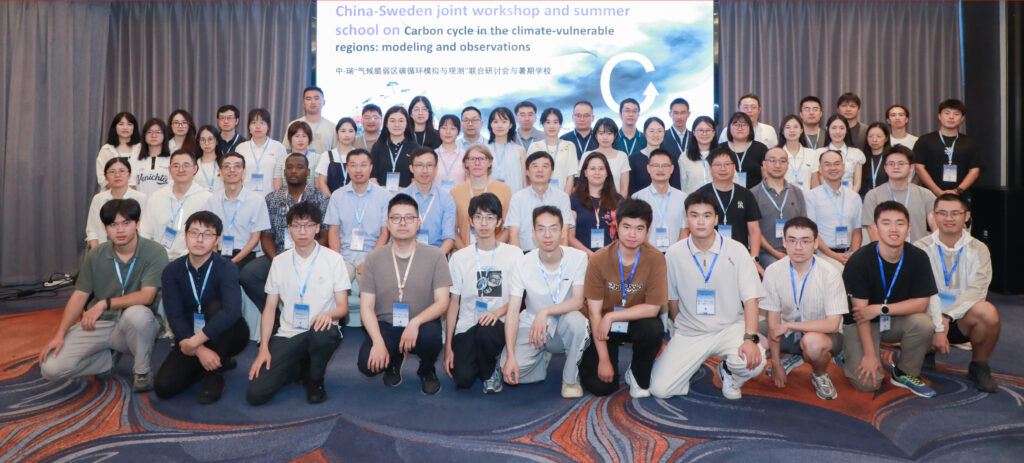Climate Dynamics Group
at Chalmers University of Technology
We study the interactions between different components of the climate system to understand how they give rise to patterns and variations on timescales ranging from days to decades.
On this site you can find more information about our group, what we do, and our output in terms of publications and other related resources. Got a question? Feel free to reach out to us!
About us
We are the Climate Dynamics Group (CDG), led by Hans Chen at the Division of Geoscience and Remote Sensing within the Department of Space, Earth and Environment at Chalmers University of Technology. We are situated in the west coast city of Gothenburg, Sweden.

In our research, we use observations, numerical models, statistical methods, model–data fusion methods such as data assimilation, and machine learning approaches to study the climate system. Our focus is on the atmosphere and its connections with other Earth system components on global to regional scales and diurnal to interdecadal timescales.
Highlighted research topics

Climate variability & change
We study climate variability and change on interannual to decadal timescales using observations and models. Our main focus is the atmosphere and its connections with the land, ocean, sea ice, ecosystems, and human systems.

Greenhouse gases
We develop methods to estimate greenhouse gas emissions based on atmospheric measurements and inverse modeling. One of our focuses is to use next-generation satellite measurements to track national-scale emissions.

Atmospheric circulation
We study the atmospheric circulation and synoptic-scale teleconnections to understand both the atmosphere’s natural internal variability, as well as how climate change has affected and will affect the circulation patterns.
News
-
First paper on atmospheric rivers
Erik Holmgren has published his first PhD-related paper on atmospheric rivers, which investigates the climatology of atmospheric rivers over Scandinavia and associated precipitation. Congratulations! 🎉
- Holmgren and Chen (2025): A climatology of atmospheric rivers over Scandinavia and associated precipitation
-
Welcome our newest group members: Fangyuan Cheng and Xinyu Yang
The Climate Dynamics Group has two new members:
- Fangyuan Cheng, PhD student
- Xinyu Yang, postdoc
They will both work with research related to climate variability & change, extreme events, and socioeconomic impacts. See their member pages for more information.
Warmly welcome!
-
Some new publications in 2025
2025 has been a busy year with not much time to write news for the website. Here’s a summary of some new publications that haven’t been mentioned here yet, including two led by Ziqian Zhong:
- Ye et al. (2025): Attributing climate and weather extremes to Northern Hemisphere sea ice and terrestrial snow: progress, challenges and ways forward
- Liu et al. (2025): Changes in atmospheric circulation amplify extreme snowfall fueled by Arctic sea ice loss over high-latitude land
- Peng et al. (2025): Characterizing spatial variability of soil organic carbon through improved machine-learning modeling with in situ data resampling: A case study in Alaska
- Zhong et al. (2025): Contrasting vegetation productivity responses in arid and humid zones to recent changes in diurnal temperature range
Wildfire:
- Chen et al. (2025): Divergent radiative forcing of fine-mode aerosols across tree genera during wildfires in North America and Europe
- Xu et al. (2025): The critical role of snowmelt onset-driven vapor pressure deficit variations in wildfire dynamics of northern latitudes
- Zou et al. (2025): Amplified urban heat island effect in southern China’s old towns following atmospheric regulation policies
- Zhong et al. (2025): Sub-diurnal asymmetric warming has amplified atmospheric dryness since the 1980s
-
Second NSFC–STINT workshop and first summer school
This summer we organized the second in-person NSFC–STINT workshop on “Carbon cycle in the climate-vulnerable regions: modeling and observations” in Nanjing, China. This time, the workshop was complemented by a summer school, providing early-career scientists with hands-on training in running three cutting-edge ecosystem modeling systems: the Terrestrial Carbon Community Assimilation System (TCCAS), Biosphere–atmosphere Exchange Process Simulator (BEPS), and Nanjing University Carbon Assimilation System (NUCAS). There were also lectures on the Global Carbon Assimilation System (GCAS) and machine learning applications in carbon cycle research.

Participants in the NSFC–STINT workshop and summer school The workshop and summer school attracted a large and diverse group of participants, and generated lively discussions across disciplines.
-
New publication on Arctic warming and wetting
Hans Chen is a co-author on a new paper published in Science Advances. This study applies the emergent constraint method to constrain projected Arctic warming and wetting based on historical global warming trend and climatological Arctic sea ice concentration.
- Cai et al. (2025): Lessened projections of Arctic warming and wetting after correcting for model errors in global warming and sea ice cover
Recent publications
Gao, S., Y. Chen, K. Li, H. W. Chen, and B. He, 2026: Urban compound heatwaves substantially offset by cooling from urbanization-promoted vegetation growth. Sustainable Cities and Society, 107249, https://doi.org/10.1016/j.scs.2026.107249.
Yan, X., J. Chen, H. W. Chen, Y. Zhang, Y. Jiang, Q. Wang, G. Wang, K. Jia, Z. Chen, W. Dong, J. Fan, and C. Zhao, 2026: Exploring global aerosol size dynamics from 2001 to 2024 using the Pretrained Remote sensing pIxel-based Spatial-teMporal Deep Neural Network. Environmental Science & Technology, https://doi.org/10.1021/acs.est.5c13469.
He, M., Y. Yi, X. Li, J.-P. Wigneron, J. S. Kimball, R. Reichle, L. Fan, and H. W. Chen, 2026: Divergent responses of multi-frequency vegetation optical depth products to climate variations in China. Journal of Remote Sensing, 6, 1028, https://doi.org/10.34133/remotesensing.1028.
Holmgren E., and H. W. Chen, 2025: A climatology of atmospheric rivers over Scandinavia and associated precipitation. Weather and Climate Dynamics, 6, 1831–1856, https://doi.org/https://doi.org/10.5194/wcd-6-1831-2025.
Xu, H., H. W. Chen, D. Chen, C. Xiao, J. Xiao, B. He, A. Lv, L. Guo, W. Yuan, Y. Fu, X. Hao, Z. Zhong, L. Huang, T. Li, R. Tang, X. He, X. Guo, and Y. Chu, 2025: The critical role of snowmelt onset-driven vapor pressure deficit variations in wildfire dynamics of northern latitudes. Earth’s Future, 13, e2025EF006367, https://doi.org/10.1029/2025EF006367.